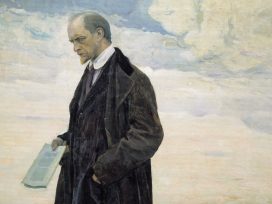Between democratic fatigue and the politics of fear
The French presidential elections 2002
This was no regular presidential election, it was a referendum on basic commitment to democratic values and an open society. Jacques Rupnik takes a look at French politics and discovers a radical shift.
The morning after Le Pen, France veered between relief and redemption. Once again a gaullist leader saved the honour of the Republic from the extremist right-wing threat: like de Gaulle against the Vichy regime in 1940, like twenty years later, at the time of the Algerian war, Jacques Chirac on May 5 presented himself as the ultimate rampart of French democracy… That is the heroic narrative of the unprecedented landslide (82 per cent) in the French presidential election. The alternative, more complacent version sees it as the conclusion of a fortnight of psychodrama of which the French are periodically fond, a measure of their utopian hopes (as in May 1968) or now of their fears and nightmares. Both versions are misleading and should be discarded. Chirac is no de Gaulle; he is no more “gaullist” than his predecessor François Mitterrand was a “socialist”. A skilful pragmatic technocrat propelled into the unlikely posture of the saviour of democracy. Nor should the sigh of relief after the storm lead anyone to believe that French politics can now return to business as usual. Both the shock of the first round with prime minister Jospin ousted of the race by a xenophobic demagogue, thus reducing the presidential race to one between the right and the extreme right, and the formidable civic mobilisation, particularly of the young generation, that followed suggest that something more significant (and long overdue) might be in the offing: the return of politics. As if, albeit briefly, everybody had (thanks to the Le Pen factor) got a glimpse of the vulnerabilities of democracy even in a country that claims to have invented it (or almost).
This was no regular presidential election. It was a referendum on basic commitment to democratic values and an open society. Hence the massive turnout even of those who had abstained in the first round (almost 30 per cent) or voted for fringe left-wing parties (15 per cent). So an unlikely mix of voters from the left, who thought Jospin too boring or too moderate, helped to bring about a landslide for a Right wing candidate who two weeks earlier had received the lowest score (20 per cent) of any incumbent presidential candidate since the V republic was established in 1958! There is nothing like seeing Le Pen, surrounded by chaps in dark shirts with shaved heads, commemorating Joan of Arc with talk of closing the borders or pulling out of the European Union, to bring the young, the disillusioned or the indifferent to cast vote for Jacques Chirac.
Which leads to the second paradox: the more votes Jacques Chirac received, the less they belong to him. Indeed the landslide has weakened the presidential office and brought into the open a long-simmering institutional crisis combined with a deeper crisis of political representation. Both are related to (and partially account for) the growth of right-wing populism in France but also in a number of other European countries.
The main casualty of the latest presidential election is (with all due respect to Mr Jospin) the Constitution of the V Republic. Tailor-made presidentialism for Charles de Gaulle, the “republican monarchy” as it has been called, was meant as a response to the ineffectiveness of the weak, fragmented and unstable IV Republic. After forty years and the shock of April 21, the old disease is back: a weakened, divided executive and a fragmented political scene. There were 16 presidential candidates (including three rival trotskiites totalling 12 per cent) in the first round. The origins of the crisis go back to 1986 when “cohabitation” of Socialist President (Mitterrand) and a Gaullist prime minister (Chirac) was first introduced and the far right National Front for the first time entered Parliament. Both proved to have disastrous results.
It is worth recalling that it was Mitterrand who introduced proportional representation for the 1986 election thus ensuring that the National Front would be represented in Parliament to weaken the respectable Right’s chances to govern. The strength of the French Communist Party had long been a handicap for the Socialists’ coming to power; the same way, Mitterrand thought, the extreme Right, would undermine the chances of the moderate Right. (Thus Le Pen was meant to block the Right from office while providing an “anti-fascist” identity for the Left in a post-ideological age.) The irony, of course, is that now it is Jospin who has been pre-empted by Le Pen and by Mitterrand’s old ploy.
More importantly: the repeated practice of “cohabitatio”‘ since 1986 (the executive branch as a two-headed monster pulling in opposite directions or, most of the time, neutralising each other) has completely undermined the spirit of the institutions of the V Republic. Imagine President George Bush with Al Gore (or Bill Clinton) in charge of his administration!
The institutional and constitutional crisis is part and parcel of a deeper crisis of political representation that accounts for the emergence of extremist populist challenge. The “cohabitation”, i.e. the moderate Right and the moderate Left sharing power, produces a deep dissatisfaction and disaffection with politics. The vote in the first round of the French presidential race was split roughly in three parts: one third for the mainstream parties, one third for the Right and Left radicals rejecting “the system”, and almost a third abstained. This, by any standard, was a massive vote of no confidence in the political class. Since the 19 century French politics have been divided between the “Party of order” and the “party of movement” with, during most of the 20 century, a sharp ideological split which became exhausted with the end of the Cold War in 1989. Over the last twenty years the Left in and out of office acquired a “culture of government”. It acquired it so well that its policies and electoral platforms (on taxation or the adaptation to market economy with a “human face”) became hardly distinguishable from that of its opponents. With the imperatives of competing in the age of economic globalisation, on one hand, and European Union regulations or monetary constraints on the other, you can tinker with policies at the margins but you cannot afford to opt out. Economics and law replaced politics with human rights as a surrogate ideology for the post-68 generation. (What indeed is the meaning of democracy and of the vote itself when political decisions are taken by non-elected bodies? The answer to this challenge could, of course, be more democracy and accountability on the European level. But the easier reflex is to call for the return of “sovereignty”.)
The center-right “cohabited” with the center-left so smoothly that basic political identities and, no less important, responsibilities, became blurred. Over the years this has provided the breeding ground for cynicism, corruption and eventually a crisis of political representation: a radical populist challenge against the “establishment” (with Le Pen revelling in confusion with his: “I am economically on the Right, socially on the Left and nationally from France.”)
When the Right/Left divide receded from French politics it was replaced by the divide between the elites and the people. The former tend to speak of “modernity, flexibility, Europe”, while the latter feel increasingly left out of the benefits of “US-promoted globalisation”, European integration and the mainstream political parties who help to bring them about. This applies to the radical Right as much as to the radical Left and both are significantly fighting over the spoils (i.e. the voters) of the now defunct French Communist Party. Le Pen’s is the largest working class vote in France today. The French elites suffer from inbreeding: they come from the same schools, speak the same discourse largely disconnected or avoiding the issues of concern to the less privileged sections of society. The French political elite is certainly part of the problem rather than the solution: under Right of Left governments, under Juppé or under Jospin, most ministers (and their staff) come from the Ecole Nationale d’Administration (ENA) also known as “enarchie”. Unless this system changes and opens up to young people with different social and cultural backgrounds, France will reproduce the dangerous combination of arrogant elitism and unbridled populism, fitting the aphorism of historian Jacques Julliard: “Elitism is democracy without the people. Populism is the people without democracy.”
Perhaps the key issue that highlights this social divide (as well as the shift of part of the popular vote from the post-communists to the proto-fascists) is the issue of insecurity. The rise of crime and insecurity are now perceived as the most blatant inequality in France. The main issue is not the working place, but the place of living. The suburbs of many French cities have become close to something the French used to identify with America: a marginalised underclass and immigrant ghettos with latent and increasingly overt violence. Now that even the mainstream parties have acknowledged the problem as a central electoral issue (Jospin admitted in the campaign that he had been “naive” in thinking that economic growth would eradicate crime). “I told you so”, Le Pen was prompt to quip back, clinging to his copyright on the identification of crime with immigration.
This is also where unaddressed real issues connect with the exploitation of dangerous fears and fantasies, which led a fifth of the French electorate to vote for an overtly xenophobic party. Yet the politics of fear is by no means a French “exception”. Indeed we see a transeuropean trend in the rise of nationalist populist movements thriving on the “security” (i.e. crime and immigration) issue combined with vociferous attacks on the European Union and its announced enlargement to Eastern and Central Europe. This, however, is not the Europe of the 1930s when fascist nationalism emerged from the dramatic collapse of the economy. This is a prosperous, thriving Europe which is tempted by xenophobia. Austria has one of the highest GNP in Europe and hardly any unemployment. It also has Jörg Haider’s anti-immigrant extreme right Party. In Italy, Bossi’s Northern League runs on a similar ticket with “foreigners” meaning anybody South of Rome. The Danish nationalist extreme right has also joined the “movement”. Le Pen’s alter ego in Belgium is the Vlaams Blok in Flanders: separatist, anti-french, anti-immigrant. Antwerpen seemed to be the capital of the European extreme right until it was upstaged by another prosperous European port, Rottterdam, where Pim Fortuyn won a staggering one third of the vote with the slogan: “The Netherlands are full up”.
The landscape of European politics is changing. Until a few years ago 12 out of 15 governments of the EU were social-democratic. Now the pendulum has shifted to the Right and even to the far Right exploiting a perceived post-September 11 interaction between domestic and external security issues. This poses new questions and new dilemmas for the mainstream democratic parties of the Right and Left.
Published 5 February 2003
Original in English
Contributed by Transit © Jacques Rupnik Eurozine
PDF/PRINTNewsletter
Subscribe to know what’s worth thinking about.




